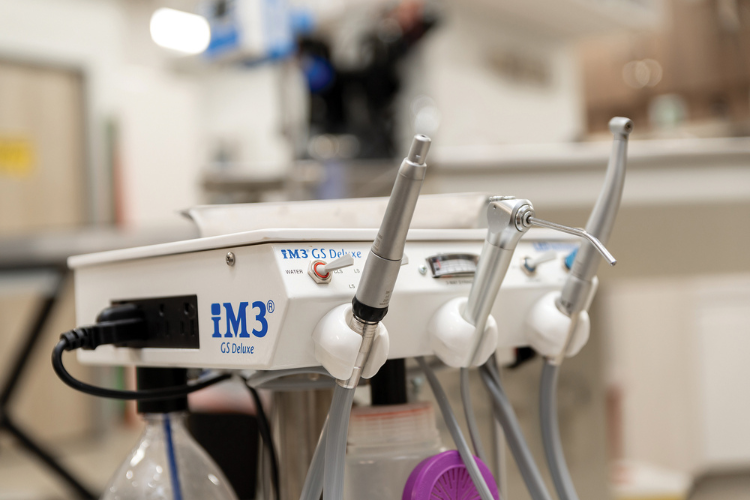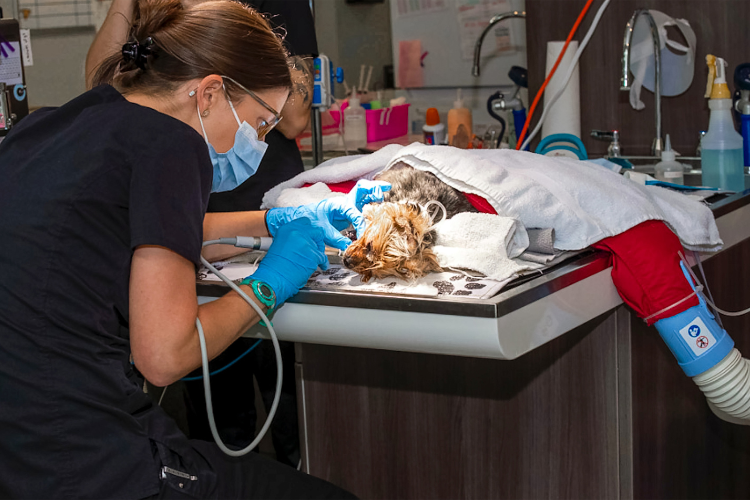Issues with dental units can sneak up on veterinary practices. Regular maintenance including checking water lines, maintaining the compressor, and lubricating handpieces is essential to keeping a machine working well. Without it, your unit can begin to work less effectively than it did when it was right out of the box.
Even subtle problems can impact patient care and add stress to your practice. Cleanings with non-maintained machines can take longer to complete, so schedules run behind, inconveniencing clients and stressing front desk staff. If a machine stops working entirely, appointments get canceled, which reflects poorly on a practice and causes missed revenue. Fortunately, it’s possible to catch issues early. Here are six sneaky signs that can alert you to problems.
1. Water pressure differences
It may be easy to dismiss a water pressure sign as something that’s related to your office plumbing, but it could be related to your unit instead. Once you notice a difference, start to track it over time. If you see a pattern of low or uneven pressure, there could be an issue with the handpiece or waterlines.2. Unusual noises
As you use your unit over time, you’re going to get used to the way it sounds. You’ll be aware of the volume, pitch and frequency of the compressor, handpieces, and suctioning. If you start to notice that anything is different, it’s a sign that your machine should be checked.3. Excessive vibration
Handpieces are designed to operate at a vibrational frequency for optimal effectiveness. Take notice if this frequency shifts, getting either slower or stronger to the point of being excessive. Taking care of a problem before it gets worse prevents excessive damage and a possible need for expensive replacement.4. Trouble changing handpiece speed
Single handpieces with multiple speeds make dental cleanings easier. Shifting between speeds should be seamless, but if this convenience factor isn’t working well your handpiece may need to be looked at.5. Weaker instrument suction
Suction is crucial to manage saliva and remove debris during cleanings, so weaker suction power is easy to notice. If you find that cleanings are taking longer or it’s harder to accomplish your tasks, take it as a sign that water lines or something within the handpiece needs to be addressed.6. Purchase date was a year ago … or more
Time flies in a busy practice. If it’s been a year, or longer, since you purchased your dental unit, chances are that it can benefit from regular maintenance. This regular maintenance will keep your machines running in top form and prevent costly problems before they happen.If you think that your dental unit might be experiencing any of these issues, or you want to get ahead of problems, there’s good news. To celebrate Pet Dental Health Month, throughout February practices can book an annual maintenance visit for just $300. With this offer, our TechEdge technicians will help your units run at peak performance through the rest of the year and prevent costly, stressful problems. Schedule your visit at 855.778.8387.
Share
Related blogs

Design Solutions to 6 Pesky Practice Problems
Senior designer April Cuellar is part of a Patterson Veterinary Hospital Design team that advises on more than 300 clinics a year. She shares how design can help with six of the most frequent challenges practices face.

The Deluxe LED Bundle that Stands Apart
The iM3 dental unit is a mainstay in veterinary clinics worldwide. The GS Deluxe features robust construction and a simple design, with all the essential tools needed for dental care. Find out why we bundled this power couple, and what makes this particular combination an exceptional value for clinics of all sizes.

Top 7 Questions From our Impact of OSHA Changes Webinar
If you missed our Impact of OSHA'S Hazard Communication Standard 2024 webinar, don't worry - we got you! In this post, we're reviewing seven of the most-asked questions, as well as outlining what has recently changed.
